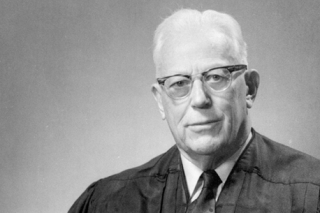About the Film
An examination of the Supreme Court’s dilemmas and tensions as it stepped into the “political thicket” of voting and representational equality, establishing the practice of what has become a core American principle: “One person, one vote.”
View trailer.
It has the echo of a core American belief. It rings with the same distinctively American clarion call for equality and individual empowerment that reaches back through the ages to the nation’s founding: “…of the people, by the people, for the people”, “All men are created equal”…
But it wasn’t until 1963 that “One person, one vote” became a widely articulated core principle of the Constitution when it was first spoken by Chief Justice Earl Warren’s Supreme Court.
The Warren Court transformed the nation’s political and social landscape in the middle of the twentieth century, applying the Constitution’s expressions of fairness and equality to American life in sometimes startling, courageous, and even jarring ways. But no decisions were as important to the nation or as grueling to the members of the Court as those surrounding equality in voting and representation, known collectively as the Apportionment Cases.
Starting with the Court’s 1962 decision in Baker v. Carr and culminating in 1964 with the case of Reynolds v. Sims, the value of “One person, one vote,” once brought to light, seemed so profoundly rooted in the Constitution its practice became “inevitable.”
Yet at the time these decisions were anything but “inevitable.” It was a wrenching, agonizing time for the Justices. To establish equality in voting and representation, the Court had to overcome deeply rooted political traditions throughout the entire nation, entrenched political powers fiercely opposed to change, and its own precedent, Colegrove v. Green, that some members of the Court believed with every bone in their bodies protected the very practice of democracy in America – as well as the integrity and viability of the Court.
Through all of this, the Chief Justice understood the urgent necessity to press ahead. Of all of the groundbreaking rulings his Court rendered throughout his tenure as Chief Justice, he called the Court’s choice to tackle this issue in Baker, its “most vital decision.”
Image Gallery
[Not a valid template]
Further Reading
Associate Justice Felix Frankfurter
Associate Justice William Brennan
Contact your Congressional Representative
Learn More About Your State Government
Credits
Producer, Writer, and Narrator, Robe Imbriano
Associate Producer, Maria E. Matasar-Padilla
Editors, Brad Smith and Marc Tidalgo
Graphics Animators, Victoria Nece and Hiroaki Sasa
Camera, Edward Marritz
Production Associate, Gregory Blanc
Coordinating Producer, Christina Lowery
Sound, Mark Mandler
Music, Ben Decter and Gavin Allen
Senior Producer, Kayce Freed Jennings
Executive Producer, Tom Yellin


